Posted in: 03/31/2021
Do you know what the daily struggles of women are? Can you recognize their motives?
Understanding all the issues faced by women throughout history, and the new ones imposed by the present time, is important for society to be able to strive to reverse inequalities and seek a fairer world for all.
So, for women, the struggle is very clear and involves two guiding principles: an end to the disparity between men and women, and the right to make the decisions that impact their own lives. But several other issues unfold directly from them.
We highlight some of the main problems that afflict women today. From their exposition, it is easier to understand why they are all connected to the base claims of the historical struggle. Check it out!
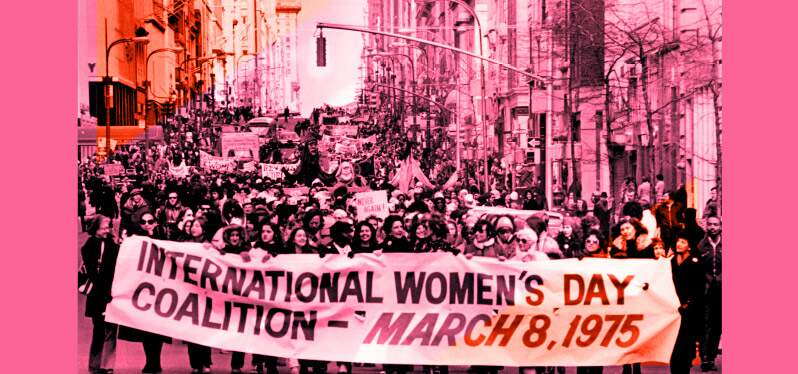
One in three women on the planet suffer physical and/or sexual violence from an intimate partner or other perpetrator throughout their lives.
7 out of 10 women in the world have been or will be harassed at some point in their lives.
137 women are intentionally killed by a family member every day in the world.
*Data from the United Nations Organization (UNO)
Even before the covid-19 pandemic happened, the United Nations (UN) already recognized gender-based violence as a global pandemic, in which the aggressor aims at controlling the woman and demonstrating superior strength, mainly through physical and/or psychological aggression. Or by sexual, moral, and property violence, with damage to property or restricted access to financial or educational resources.
Black and minority women and girls are the biggest victims, since they also suffer from prejudice and racial and ethnic violence. But all women and girls are affected directly or indirectly by gender-based violence.
However, recently, the executive director of UN Women stated that violence against girls and women can be considered an “invisible pandemic,” growing as another one of the consequences suffered by women during the coronavirus pandemic.
Studies show that after disasters or crisis situations, gender inequalities and rates of violence within the family increase, driven by factors such as financial and psychological stress. Isolation, and the difficulties of accessing support networks and care services, increase the risk factors for women.
The occurrences can follow two trends: aggravation of situations where aggression had already occurred prior to the isolation period, and the manifestation of violence in relationships where it did not previously exist.
In April 2020, when several countries were already adopting the confinement and quarantine measures, the United Nations Population Fund (UNFPA), the sexual and reproductive health agency of the United Nations, released a report with alarming estimates:
Due to the interruption of prevention and assistance programs:
Many of the projections could not yet be confirmed, but several countries have reported increases in the number of feminicides between March and April 2020 compared to the same period in 2019, according to a report by ActionAid.
According to the Brazilian Forum for Public Security (FBSP), 648 feminicides were recorded in the first half of 2020, 1.9% more than in the same period of 2019. The calls to 180, the reporting channel for this type of crime, increased 40% during the first months of the pandemic, according to data from the Ministry of Women, Family and Human Rights (MMDH).
On the other hand, the number of police report registrations fell. But the news is not good. This may indicate the difficulty women are encountering in reporting the violence they have suffered, both because of the closure of assistance services and because of the greater proximity to the aggressor, which makes it more difficult to ask for help.
In Brazil, the lack of consistent punishment and loopholes in the laws, which end up quickly putting the aggressor back on the streets, have for centuries reinforced the feeling of impunity, creating a scenario that can only be changed by changing the social mentality on the issue.
Many were the situations that propelled women to the frontline in the fight against the coronavirus and, at the same time, as the group most vulnerable to the social storms imposed by it.
According to a report by UN Women, worldwide, they represent 70% of the people working in the health and social sectors, which are the front line for confronting COVID-19. Yet they hold only 25% of the leadership positions. In Brazil, according to the IBGE, they represent 65% of the health professionals in the public and private sectors.
The IBGE also pointed out that about 7 million women left their jobs at the beginning of the pandemic, 2 million more than the number of men in the same situation. This is because women represent 80% of informal jobs in the country, as well as being the majority in the service sector. Both areas were the most affected by closures and isolation to ensure security measures against Covid-19.
Those who have been able to keep their jobs have to face a reality that is difficult and divided between the working day, the presence of children at home full time, and the assistance in remote education, the care of family members and household activities, most of the time without equal division for those who have partners. Self-care time, primordial to maintaining mental health, has been all but wiped from their schedules.
But even as they face the daily inequalities and difficulties imposed by the pandemic, they demonstrate their strength on the front lines of the fight:
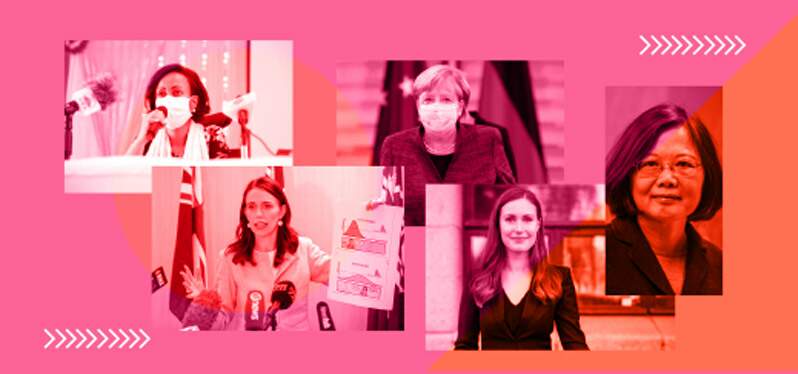
“Clear communication, quick decisions, and the willpower to listen to science” were the qualities attributed by Forbes Magazine to the heads of state that have been standing out for their actions during the pandemic.
Angela Merkel of Germany, Jacinda Ardern of New Zealand, Mette Frederiksen of Denmark, Tsai Ing-wen of Taiwan, Sanna Marin of Finland, and Erna Solberg of Norway have all achieved extremely positive results in policies to confront and contain the coronavirus, especially when compared to men in the same role.
Although they have different leadership profiles, according to the survey conducted by the World Economic Forum, they all had common characteristics in their approach against the virus. The more empathetic posture, with tendencies to listen more to the population and the trusted names elected to the ministries and scientific support bodies, and less inclined to take risks, adopting early country closures. They have made a commitment to take care of the health of the population above the economic risks that could be caused.
But women have not only distinguished themselves in politics. In the field of sciences, several female researchers have demonstrated the strength that women can achieve when they manage to occupy spaces in all areas, even in those where there has always been resistance to them.
And when we talk about science, it took many years and subterfuge before their abilities could be recognized and they could enter the scientific field. Data from Ipea (Institute for Applied Economic Research) point out that in the humanities, social, and biological sciences, women are the majority (more than 60%). However, they represent less than 25% in thee areas of computer science and mathematics.
For a long time, they have engaged in emerging fields of study and needed to prepare themselves twice as much to respond to male confrontations. Many of them stayed in their husbands’ shadow for long years, even when they were doing most of the discovering and hard work, like Marie Curie, the discoverer of radioactivity.
This is why, today, it is so important to give visibility and recognition to the scientists who have been outstanding in the fight against the Covid-19 pandemic. Among them, names that became known, such as Ester Cerdeira Sabino and Jaqueline Goes de Jesus, Patricia Rocco, Marinalda Siqueira, Ana Paula Fernandes, and Marisa Dolhnikoff.
Investing in gender equality is important to reinforce the fight for recognition and empowerment, essential to inspire and promote actions so that future generations of girls and women can occupy more positions of power and decision-making in society.
Leadership positions, equal representation, political, economic and social empowerment are essential to change the reality of girls and women, so that they can finally assume the right to make the decisions that impact their own lives.
Therefore, it is important to point out that all the actions for change for women came from feminist groups that, although distinct, have common demands: an end to harassment, violence against women, and gender disparity.
This multiplicity of groups is called intersectional feminism, and comprises the main agendas and demands of indigenous, quilombola, white, black, and trans women’s feminism.
From the specific and different representations, it is possible to seek to achieve the objectives of the various groups and women’s claims, while fighting for the main issues that they have in common.
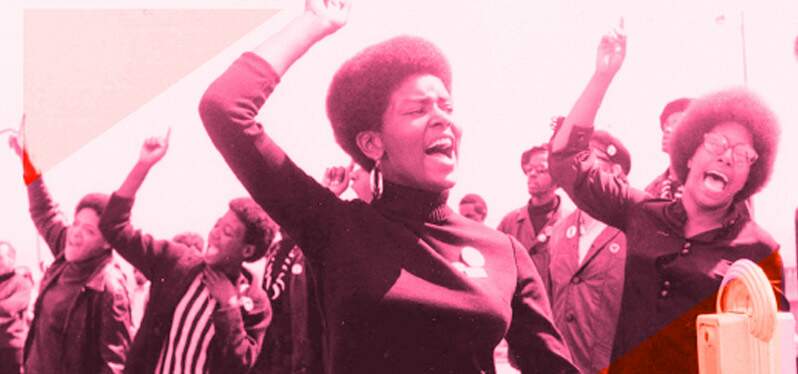
The battle for equal rights is fundamental to ensure the creation of laws and measures to improve people’s lives and living together in society.
Check out some recent advances in the issue of women’s rights, in Brazil and around the world.
Brazil
Just this month (March 2021) Brazil abolished the legal thesis of “Legitimate defense of honor”, which was used to justify feminicides on the grounds of protecting the man’s honor through infidelity committed by the woman.
World
*The Synergia Women’s Month campaign is part of the series of annual actions we carry out to address issues of great importance to society, and that are crucial to reducing inequalities, such as the Black Awareness Month campaign, Indigenous Peoples’ Month, and others. This text is a shortened version of what was published internally, for our employees. *
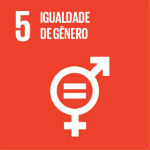
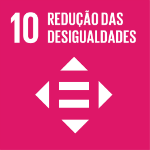
Sign up and receive our news.